In the realm of construction, metal roofing has emerged as a popular and reliable alternative to traditional materials like shingles or tiles. Offering superior durability, weather resistance, and a sleek aesthetic, metal roofs are a compelling choice for residential, commercial, and industrial applications. But how exactly are these metal panels shaped and formed? Enter the roof tile panel roll forming machine, the unsung hero behind the surge of metal roofing.
Components of Roof Tile Panel Roll Forming Machine
At the heart of a roof tile panel roll forming machine lies a series of stations, each equipped with specifically designed rollers. Imagine a long metal sheet being fed through an assembly line, and with each station, the sheet is progressively bent and shaped into the desired roof tile profile. Here’s a breakdown of the key components:
- Uncoiler: This motorized unit feeds the metal coil (typically steel or aluminum) into the machine.
- Roll Forming Stations: The heart of the machine, these stations house sets of precisely contoured rollers that progressively transform the flat sheet into the final roof tile profile. The number of stations varies depending on the complexity of the profile.
- Cutting System: Once the desired profile is formed, a cutting unit shears the continuous sheet into predetermined lengths, creating individual roof tiles.
- Stacker: This automated system carefully stacks the finished roof tiles onto a pallet or designated area, ensuring efficient handling and preventing damage.
- Control Panel: The brain of the operation, the control panel allows the operator to regulate production speed, monitor machine parameters, and adjust settings for different roof tile profiles.

Industrial Applications of Roof Tile Panel Roll Forming Machine
The versatility of roof tile panel roll forming machines extends to a wide range of industrial applications:
- Residential Roofing: From classic corrugated profiles to more intricate designs mimicking the look of traditional tiles, these machines produce a vast array of metal roofing options for homes.
- Commercial Buildings: Industrial warehouses, office complexes, and retail stores all benefit from the strength, longevity, and fire resistance of metal roofs produced by roll forming machines.
- Agricultural Structures: Barns, stables, and other agricultural buildings require durable and weatherproof roofing solutions, which metal roofs efficiently deliver.
- Industrial Facilities: With their ability to withstand harsh environments and extreme weather conditions, metal roofs formed by roll forming machines are ideal for factories and industrial plants.
Factors to Consider When Choosing a Roof Tile Panel Roll Forming Machine
Selecting the right roof tile panel roll forming machine hinges on several crucial factors:
- Desired Roof Tile Profile: The complexity of the profile you intend to produce will influence the number of roll forming stations required in the machine.
- Production Capacity: Consider the volume of roof tiles you plan to manufacture. Machines come in various capacities, from small-scale operations to high-output industrial settings.
- Material Compatibility: Ensure the machine is compatible with the type of metal coil you plan to utilize, such as steel or aluminum.
- Machine Automation Level: Choose a level of automation that aligns with your production needs and budget. Manual, semi-automatic, and fully automatic machines are available.
- Budget: Roof tile panel roll forming machines encompass a wide price range depending on factors like complexity, capacity, and brand.
Advantages and Considerations of Roof Tile Panel Roll Forming Machines
Advantages:
- Cost-Effective Production: Compared to pre-fabricated metal roof panels, roll forming machines offer a cost-effective way to manufacture roof tiles on-site, reducing material and transportation costs.
- Design Flexibility: These machines provide the ability to produce a wide variety of roof tile profiles, catering to diverse architectural styles and functional needs.
- Efficient Production: Modern roll forming machines boast impressive production speeds, enabling the swift generation of large quantities of roof tiles.
- Reduced Waste: With precise cutting systems, roll forming machines minimize material waste compared to traditional roofing methods.
Considerations:
- Initial Investment: The upfront cost of a Roof Tile Panel Roll Forming Machine can be substantial.
- Operational Expertise: Operating a roll forming machine requires a certain level of training and technical knowledge.
- Maintenance Requirements: Regular maintenance is essential to ensure the machine’s performance and longevity.
-
 Weld pipe roll forming machine
Weld pipe roll forming machine -
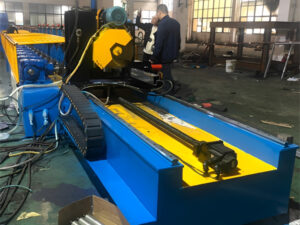 Joint Rack steel beam roll forming machine
Joint Rack steel beam roll forming machine -
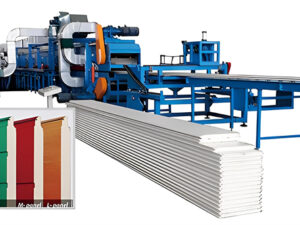 Garage door panel roll forming machine
Garage door panel roll forming machine -
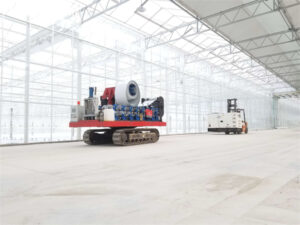 Green modern Agriculture gutter panel roll forming machine with tank chain
Green modern Agriculture gutter panel roll forming machine with tank chain -
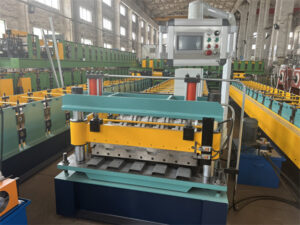 Roll forming machine China for Automatically PPGI Fence Panel
Roll forming machine China for Automatically PPGI Fence Panel -
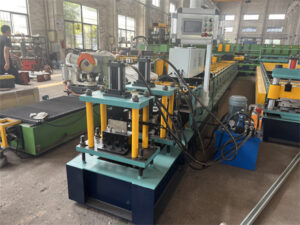 Roll forming machine company for Fence guide Rail
Roll forming machine company for Fence guide Rail -
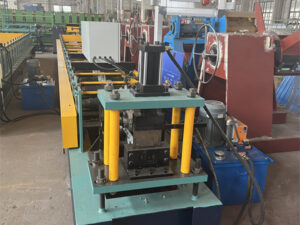 Roll forming machine cost for Fence post guide rail good price
Roll forming machine cost for Fence post guide rail good price -
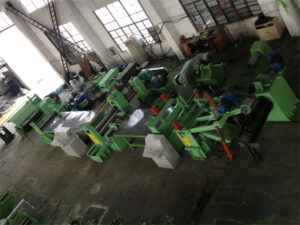 Cut To Length Line
Cut To Length Line -
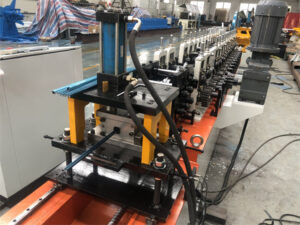 Stainless U Channel for Glass Window Supporter Machine
Stainless U Channel for Glass Window Supporter Machine
FAQ
What is a Roof Tile Panel Roll Forming Machine?
A roof tile panel roll forming machine is a metalworking machine that creates long, continuous sheets of metal roofing panels. It does this by feeding metal coils through a series of rollers that progressively bend and shape the metal into the desired profile. These machines are essential for construction projects that use metal roofing.
What are the Different Types of Roof Tile Panel Roll Forming Machines?
There are several types of roof tile panel roll forming machines, each suited for different needs. Here are two main categories:
- By Number of Passes:
- Single-Pass: These machines offer high accuracy and consistency by forming the metal in one go.
- Multi-Pass: These machines may require the metal to pass through the rollers multiple times to achieve the final profile.
- By Functionality:
- Standing Seam: These machines create panels with a raised seam for a watertight fit.
- Metal Deck: These machines produce flat or corrugated metal sheets for use as a base for other roofing materials.
What are the Advantages of Using a Roof Tile Panel Roll Forming Machine?
- Cost-effective: Producing panels on-site can be cheaper than purchasing pre-made panels.
- Flexibility: You can create panels in various lengths and profiles to meet specific project requirements.
- Reduced Waste: Machines minimize material waste compared to pre-cut panels.
What are some Important Considerations When Choosing a Roof Tile Panel Roll Forming Machine?
- Production Capacity: Consider the volume and type of panels you plan to produce.
- Panel Thickness and Width: Ensure the machine can handle the desired metal coil specifications.
- Machine Quality: Look for a sturdy build and well-designed rollers for long-lasting performance.
- Ease of Use and Maintenance: Consider the level of operator training required and the machine’s maintenance needs.
